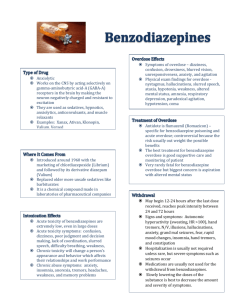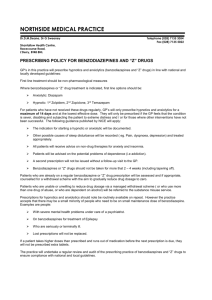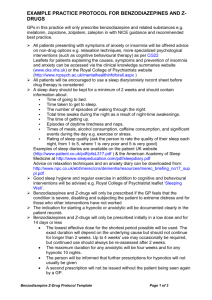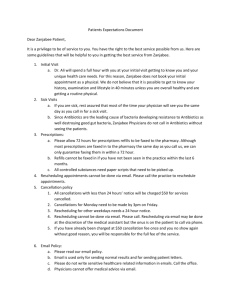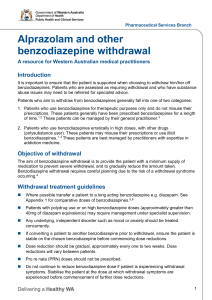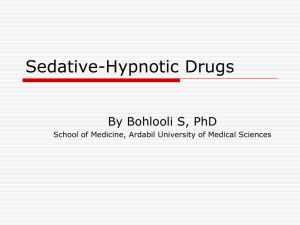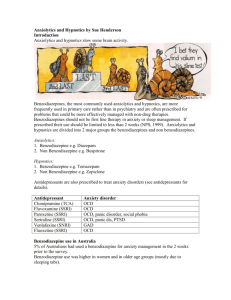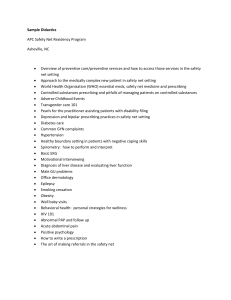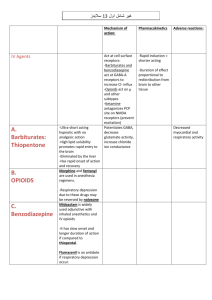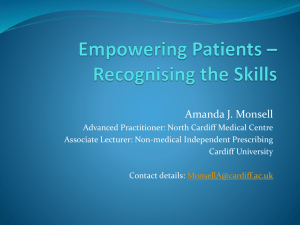Reconnexion submission document (Word 60 KB)
advertisement
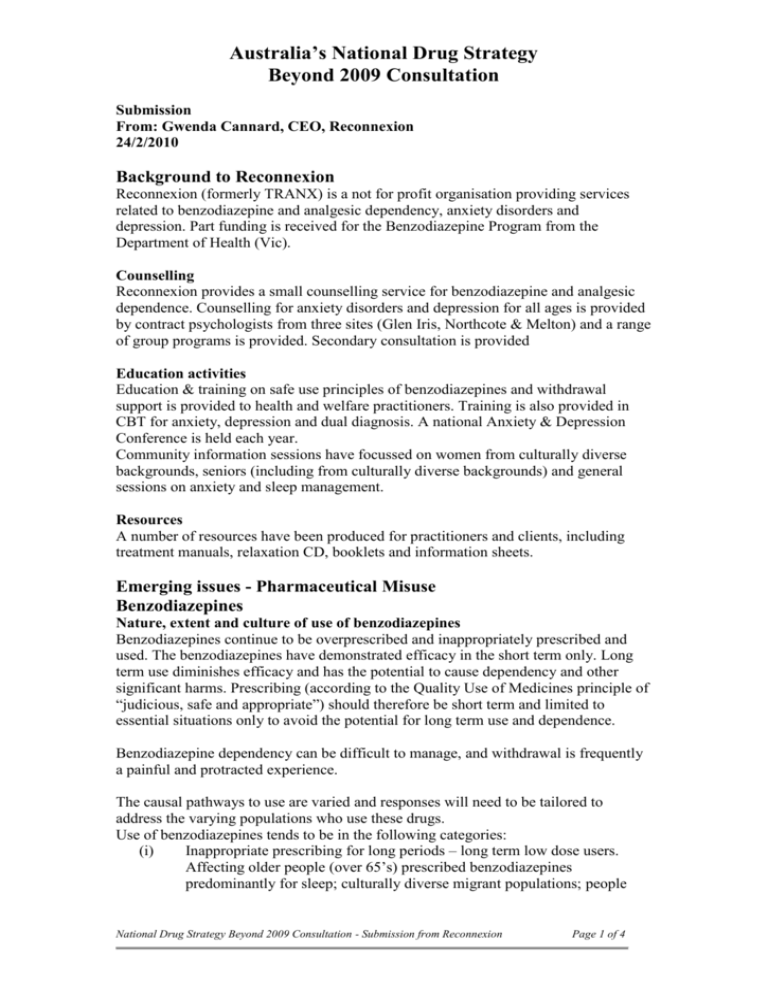
Australia’s National Drug Strategy Beyond 2009 Consultation Submission From: Gwenda Cannard, CEO, Reconnexion 24/2/2010 Background to Reconnexion Reconnexion (formerly TRANX) is a not for profit organisation providing services related to benzodiazepine and analgesic dependency, anxiety disorders and depression. Part funding is received for the Benzodiazepine Program from the Department of Health (Vic). Counselling Reconnexion provides a small counselling service for benzodiazepine and analgesic dependence. Counselling for anxiety disorders and depression for all ages is provided by contract psychologists from three sites (Glen Iris, Northcote & Melton) and a range of group programs is provided. Secondary consultation is provided Education activities Education & training on safe use principles of benzodiazepines and withdrawal support is provided to health and welfare practitioners. Training is also provided in CBT for anxiety, depression and dual diagnosis. A national Anxiety & Depression Conference is held each year. Community information sessions have focussed on women from culturally diverse backgrounds, seniors (including from culturally diverse backgrounds) and general sessions on anxiety and sleep management. Resources A number of resources have been produced for practitioners and clients, including treatment manuals, relaxation CD, booklets and information sheets. Emerging issues - Pharmaceutical Misuse Benzodiazepines Nature, extent and culture of use of benzodiazepines Benzodiazepines continue to be overprescribed and inappropriately prescribed and used. The benzodiazepines have demonstrated efficacy in the short term only. Long term use diminishes efficacy and has the potential to cause dependency and other significant harms. Prescribing (according to the Quality Use of Medicines principle of “judicious, safe and appropriate”) should therefore be short term and limited to essential situations only to avoid the potential for long term use and dependence. Benzodiazepine dependency can be difficult to manage, and withdrawal is frequently a painful and protracted experience. The causal pathways to use are varied and responses will need to be tailored to address the varying populations who use these drugs. Use of benzodiazepines tends to be in the following categories: (i) Inappropriate prescribing for long periods – long term low dose users. Affecting older people (over 65’s) prescribed benzodiazepines predominantly for sleep; culturally diverse migrant populations; people National Drug Strategy Beyond 2009 Consultation - Submission from Reconnexion Page 1 of 4 Australia’s National Drug Strategy Beyond 2009 Consultation (ii) (iii) (iv) with anxiety disorders and women (2:1 ration to men). This is also related to (ii). Prescribing as an inadequate response to the problem. Affecting people with abuse issues e.g. sexual abuse and family violence. Reliance on benzodiazepines and potential dependency becomes a barrier to more effective support or treatment. Substitution or enhancement of illicit drugs. Many users obtain their supply from GP’s – either using strategies to convince or intimidate GP’s, or finding an irresponsible GP who overprescribes routinely and has developed a reputation. Some of the drugs may then be sold. Prescribing for young people or older drug using patients ostensibly to support their withdrawal from illicit drugs. This well meaning prescribing almost invariably leads to a dual addiction. Use of analgesics tends to be in the following categories: (i) Prescribing for people with an acute or chronic injury or condition requiring opioid analgesics who subsequently develop an addiction to the drugs (ii) Prescribed or over the counter use by people who commence using these drugs for a psychological effect (or sleep) and develop tolerance and dependency on the drugs (iii) Substitution or enhancement of illicit drugs. Many users obtain their supply from GP’s – either using strategies to convince or intimidate GP’s, or finding an irresponsible GP who overprescribes routinely and has developed a reputation. Some of the drugs may then be sold. The impact of long term benzodiazepine use for people taking prescribed doses for long periods of time is often overlooked; however it can be argued that these people suffer as much if not more from the effects of these drugs as do their counterparts taking much higher amounts. Extent of benzodiazepine and analgesic use The overall use of benzodiazepines has decreased significantly since the peak prescribing of the 1980’s. From the early 1990’s, however, the extent of use seems to have reached a plateau rather than a continued decline, and use appears to be increasing. Comparisons between the National Health Survey of 2004/5 and that of 2007/8 show an increase in all medications taken by adults who identified as having a mental health problem. 27% (72%) reported using antidepressants, 23%(27%) sleeping pills and 10%(23%) for anxiety and nerves. (Figures in brackets are 2007/8) Prescriptions for morphine based analgesics have doubled from 1995 to 2003. Harms related to benzodiazepine and analgesic use These have been well documented and include: Dependence and withdrawal effects Relationship to criminal activity Suicide attempts Drug overdose Cognitive effects for long term users Health risks associated with injecting National Drug Strategy Beyond 2009 Consultation - Submission from Reconnexion Page 2 of 4 Australia’s National Drug Strategy Beyond 2009 Consultation Health risks to the stomach, liver and kidneys (analgesics) Increased risk of falls and other health problems(older people) Increased anxiety and insomnia Increased depression Effects on GP’s – morale and reputation re prescribing –particularly opioid analgesics to addicted users Poorly managed chronic pain. Responses to the issue Development of a National Benzodiazepine (and Analgesic)/Pharmaceuticals Strategy which would incorporate the following: 1. Community education initiatives. Community understanding of drug use needs to be ‘broadened’ to include benzodiazepines and analgesics – currently people do not conceptualise these as ‘drugs’ and do not associate their overuse with ‘drug addiction’. 2. Community education activities to include culturally and linguistically diverse and indigenous people. 3. Community education and support for family and friends of dependent users of benzodiazepines and analgesics (and all drugs). 4. Research – benzodiazepine withdrawal strategies. Current research trials into the efficacy of Flumazenil (a benzodiazepine antagonist) should be extended dependent on outcomes. 5. Research – extent of use. The National Drug Strategy household survey to include drugs used for anxiety, sleep or pain – not described as ‘non medical’ use. Other surveys on length of time of benzodiazepine use. 6. Research – on line treatment approaches – similar to Anxiety Online for people dependent on benzodiazepines and analgesics (and other drugs or alcohol). 7. Research into the barriers for GPs relating to alternatives to benzodiazepine prescribing. 8. GP education initiatives – appropriate prescribing, risks and safe use principles for use of benzodiazepines (and other hypnotics)and “How to say No to doctor shoppers” strategies. 9. GP education and support materials for insomnia – particularly in older people. 10. GP education and support for reducing benzodiazepines and withdrawal support. 11. GP education and support for the management of pain. National Drug Strategy Beyond 2009 Consultation - Submission from Reconnexion Page 3 of 4 Australia’s National Drug Strategy Beyond 2009 Consultation 12. Significant and timely ramifications for GP’s identified as prescribing large amounts of benzodiazepines and/or analgesics routinely. 13. Education initiatives for residential aged care staff on alternatives to benzodiazepines and antipsychotics for patient management and sleep 14. Increased number of specialist pain management clinics 15. Continued support for the Alcohol & Drug sector and practitioners to build on the dual diagnosis capacity of services (currently provided through the Department of Health & Ageing, Improved Services Capacity Building Grant); to include sexual abuse capacity. 16. Initiatives or policies to ensure consistency of approach (evidence based) with Alcohol & Drug residential withdrawal support treatment for people withdrawing from benzodiazepines. Similarly for residential rehabilitation services. Department of Health funding to allow for longer treatment. 17. Training and education opportunities for psychologists in drug and alcohol and dual diagnosis issues. Psychologists are moving into private practice in increasing numbers, due largely to the Better Access MBS initiative – they often have little knowledge relating to medications and substance use. 18. Increased resources to allow improved follow up practices to be routinely undertaken for patients leaving hospital in pain and with prescriptions for analgesics. 19. Discharge policy for hospitals ensuring patients are not discharged with a benzodiazepine script. For a comprehensive article on the issues of benzodiazepine and analgesic use and prevention strategies, see Neilsen S. and Thompson N. Prevention of Pharmaceutical Misuse, DrugInfo, Australian Drug Foundation. National Drug Strategy Beyond 2009 Consultation - Submission from Reconnexion Page 4 of 4
